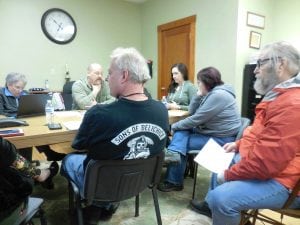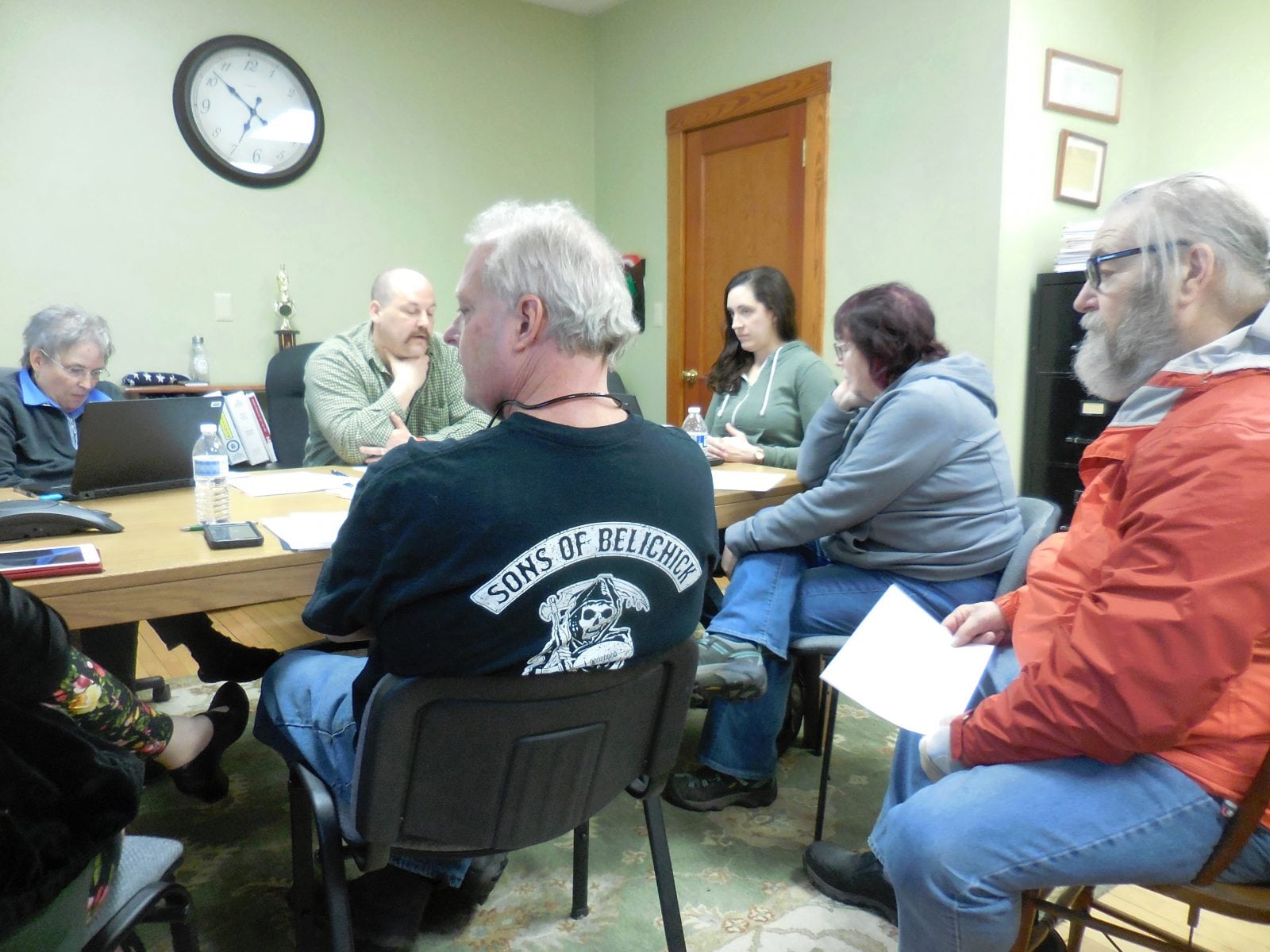
Huntington Selectmen and Cable Advisory Board members discuss Comcast contract Wednesday. (Photo by Amy Porter)
HUNTINGTON – Chris Saner, Johanna Brackney and Robert Brackney of the town’s Cable Advisory Board met with Huntington selectmen Edward Renauld and Darlene McVeigh on Wednesday, April 4 to continue discussing the Comcast contract with the town, which has been in negotiation since 2014.
Renauld welcomed them back, and said that Comcast has completed the work of laying cable to the homes covered under the Massachusetts Broadband Institute grant for last-mile connectivity to 96% of residents, which will bring cable to an additional 77 homes in Huntington.
Saner said he had driven down every road, and they had completed it. Roads that were recently cabled include Goss Hill Road to the town line, Pisgah Road, Barr Hill, Bean Hill, Tucker Road, Sampson Road and Montgomery Road to the town line.
“As far as I can tell, they did the 77 homes outlined in the grant agreement, and went over 96%. We still have 17 (homes) unserved, Saner said. He said unserved homes include ones located on Upper Bromley, Knightville Dam, Littleville Road, Harlow Clark Drive and Thomas Road.
He said there are also a few homes on Route 112 near Worthington that cannot be cabled, because there are no telephone poles along that stretch. He said he believes that Worthington will be getting a contract with Comcast, which should enable those residents to be served in the future.
“The good news is protection for the MBI buildout. Now, we’re at an impasse regarding those 17 homes,” Saner said.
He said the impasse concerns the cost of the buildout for the 17 homes. Comcast has said it will cost $139,000, which is expected to be raised from a surcharge of 3% to cable television subscribers for the first seven years of the contract. Saner said the Cable Advisory Board wants Comcast to guarantee the price of $139,000.
“The buildout would be on the back of our subscribers. We’re giving them a way out. They’re not giving us any cost guarantees,” Saner said.
“Why would they want to make it prohibitive,” asked McVeigh.
“I don’t know. We’re giving them an easy way out by buildout on the back of customers. We’re only asking that the cost estimates hold true. We’re giving them a way better deal than the last eight towns on franchise agreement,” Saner said, adding that Huntington is not asking Comcast to pay for line extensions, which the other towns got before the MBI grant agreement paid for them, and no capital contribution, only the 3% from the PEG surcharge.
“What we’re asking for is a light ask. But to give back cost control of buildout,” Saner said, adding that he didn’t feel the town’s attorney, William Hewig, III of KP Law, had respected their wishes in negotiations.
“We’re happy with our attorney,” Renauld said. He then dialed Hewig into the meeting on a conference call.
Hewig said that Comcast had sent him a draft renewal of the license with a number of changes, “some substantive; some editorial.” He said the reason for the changes was the old document was unreadable due to the number of edits, and Eileen Leahy of Comcast had created a new document.
“I think I can edit the draft Eileen gave us, and put the things back in that are important to the town,” Hewig said. He asked which option under the 10-year term of the license the town wanted to take; one that would allow the cabling to the 17 homes in years five and six, or in years seven and eight.
“Didn’t we talk about frontloading that money to get it done quicker,” asked Renauld.
“Our new sticking point: We need contractual guarantees that the money will be sufficient for the buildout,” Saner said.
“You’ll never get that. How could anybody completely guarantee (costs) with the stock market going up and down,” Hewig said.
“All we’re giving them is a sweet deal,” Saner said.
Hewig said he had already addressed this with Comcast, who took back five or six items in the contract proposal. “One was that Comcast has to guarantee that $139,000 is going to be a valid estimate for five to eight years. I’ve never seen anything like that in a cable license,” Hewig said.
“If they’re unwilling to guarantee the estimate, then we’re back to the drawing board,” Saner said.
After further discussion, Hewig agreed to make the changes to the contract being requested, as well as some items he felt should be added back into the draft, and send it to the Cable Advisory Board and to the Board of Selectmen redlined with his changes.
“We’re making progress, I think,” Hewig said.








